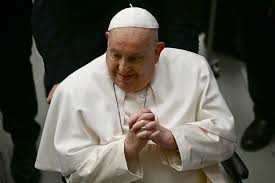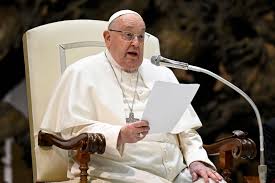

By Violet Auma.
As the Vatican prepares for a year of spiritual reflection and grand celebrations, Pope Francis finds himself in the hospital, battling a severe case of polymicrobial pneumonia.
The illness, which has affected both of his lungs, comes at a critical time for the Catholic Church, with millions of pilgrims expected in Rome for the Holy Year festivities.
Polymicrobial pneumonia is a severe lung infection caused by multiple types of pathogens, including bacteria, viruses, and fungi.
This condition leads to increased inflammation and fluid accumulation in the lungs, making breathing difficult.
Pope Francis, born Jorge Mario Bergoglio in Buenos Aires, Argentina, has a life story marked by perseverance.
Before becoming the head of the Catholic Church in 2013, he had faced numerous personal and health challenges.
In his early 20s, he suffered from a severe lung infection that led doctors to remove part of his lung.
While the surgery saved his life, it also left him more vulnerable to respiratory illnesses, making his current battle with pneumonia especially concerning.
Throughout his papacy, Pope Francis has demonstrated remarkable resilience, continuing to lead the Church despite ongoing health struggles.
In recent years, he has undergone intestinal surgery and has faced mobility issues, often requiring the use of a wheelchair.
Now, at 88, his latest health challenge raises concern about his ability to maintain his demanding schedule.
Medical experts explain that Pope Francis is suffering from double pneumonia, meaning both of his lungs are affected.
Dorothy H. Brendah, President of the Africa Respiratory Care Association, elaborates:
“Double pneumonia means the right and left lung have been affected. A polymicrobial infection means that multiple types of germs bacteria, viruses, or fungi are causing the infection, leading to fluid accumulation in the lungs and difficulty breathing.”
Given his previous lung surgery, Pope Francis’ condition is more precarious than for someone with fully intact lungs.
His compromised respiratory system makes it harder for his body to fight infections and recover quickly.
Symptoms of polymicrobial pneumonia include a persistent cough producing mucus or pus, shortness of breath, chest pain, fever, chills, fatigue, muscle aches, and confusion in severe cases.
The disease is a significant health burden worldwide.
According to the World Health Organization, pneumonia is the leading cause of death among children under five, accounting for 14 percent of all child deaths globally.
Over 2.5 million people die annually from pneumonia-related complications, and in Africa, the illness remains a top infectious killer, particularly in regions with limited access to healthcare.
The COVID-19 pandemic exacerbated cases, with many pneumonia-related hospitalizations being polymicrobial in nature.
Doctors have placed him on a course of antibiotics to combat the infection and anti-inflammatory medication to ease his symptoms.
The Pope’s hospitalization casts a shadow over the Holy Year, a significant event for Catholics worldwide.
The Holy Year, officially known as a Jubilee Year, is a time of pilgrimage, prayer, and renewal, drawing millions of believers to the Vatican.
In December, Pope Francis presided over the ceremonial opening, emphasizing the importance of faith and unity in a world facing turmoil.
However, with his health now in question, uncertainty looms over his ability to actively participate in upcoming events.
Vatican officials have not given a timeline for his discharge but maintain that the Pope “remains in good spirits.”
While the faithful continue to pray for his recovery, Church leaders are likely preparing contingency plans should his health limit his public appearances.
Pope Francis’ illness serves as a poignant reminder of the fragility of human life, even for a leader revered by over a billion Catholics worldwide.
His tenure has been marked by progressive stances on social issues, calls for environmental protection, and efforts to bridge divisions within the Church.
His current health struggle raises the question of succession, though the Pope has not indicated any plans to step down.



